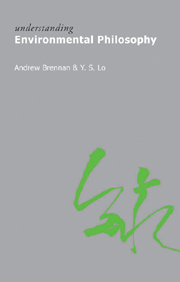Book contents
- Frontmatter
- Contents
- Acknowledgements
- 1 Introduction: the place of environmental philosophy and its basic concepts
- 2 Future generations: what consideration do we owe them?
- 3 Animals: are they as morally valuable as human beings?
- 4 Living things: ethics for the non-human world
- 5 Community: how big is our moral world?
- 6 Natural things: the puzzle of what “natural” means, and whether humans belong to nature
- 7 Foundations: can there be a secular basis for the ideas of human dignity and intrinsic value in nature?
- 8 Origins: political, religious and cultural diagnoses of environmental problems
- 9 Beyond individual responsibility: governance and the affluenzic society
- Questions for discussion and revision
- Further reading
- Bibliography
- Index
9 - Beyond individual responsibility: governance and the affluenzic society
- Frontmatter
- Contents
- Acknowledgements
- 1 Introduction: the place of environmental philosophy and its basic concepts
- 2 Future generations: what consideration do we owe them?
- 3 Animals: are they as morally valuable as human beings?
- 4 Living things: ethics for the non-human world
- 5 Community: how big is our moral world?
- 6 Natural things: the puzzle of what “natural” means, and whether humans belong to nature
- 7 Foundations: can there be a secular basis for the ideas of human dignity and intrinsic value in nature?
- 8 Origins: political, religious and cultural diagnoses of environmental problems
- 9 Beyond individual responsibility: governance and the affluenzic society
- Questions for discussion and revision
- Further reading
- Bibliography
- Index
Summary
Many contemporary industrial societies are characterized by the condition some writers call “affluenza”. In the affluenzic society, the continuous growth in material wealth and consumption of material goods sits at the centre of human life and aspirations, rapidly reducing and replacing other goals and values of human fulfilment (James 2007). Constituted by a set of robust positive feedback mechanisms, affluenza is the larger system under which many local and global economies now operate, and which shapes the personal values of many indivduals and the social priorities of many nations and governments. Although globalization has very effectively rapidly expanded the territory of affluenza and further strengthened its already vigorous structure, it has not been analysed or studied by environmental philosophers. In this chapter, we look at what affluenza might be, speculating about its structure and causes. If you think we are right about affluenza, and if you think it may be a problem that obstructs us in tackling environmental problems, then we hope you are able to give some thought to the obvious question: is there a way of controlling the damaging and destructive tendencies that are present in affluenzic societies? This may be one of the most important environmental questions facing us in the twenty-first century.
While much of the emphasis in philosophy and policy discussions is on how individuals can respond to the challenges posed by environmental catastrophe and climate change, our analysis of affluenza poses a new problem.
- Type
- Chapter
- Information
- Understanding Environmental Philosophy , pp. 181 - 207Publisher: Acumen PublishingPrint publication year: 2010

